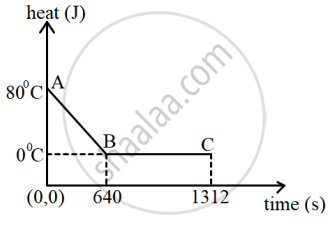Advertisements
Advertisements
प्रश्न
Why are athletes advised to put on extra clothes after competing on event?
उत्तर
Athletes perspire profusely after competing in an event. The latent heat of evaporation of the ‘sweat’ is withdrawn from the body itself and therefore, cools the body. Hence, if they do not put on extra clothes, they are likely to catch cold.
APPEARS IN
संबंधित प्रश्न
Calculate the mass of ice required to lower the temperature of 300 g of water 40°C to water at 0°C.
(Specific latent heat of ice = 336 J/g, the Specific heat capacity of water = 4.2J/g°C)
In an experiment to determine the specific heat capacity of a solid following operations were
made:
Mass of calorimeter + stirrer = x kg
Mass of water = y kg
Initial temperature of water t1℃
Mass of solid = z kg
Temperature of solid = t2 ℃
Temperature of mixture = t ℃
Specific heat capacity of calorimeter and water are c1 and c2 respectively. Express the specific
heat capacity c of the solid in terms of the above data.
Define the term 'specific heat capacity' and state its unit.
m kg of a substance of specific heat capacity s J/kg °C is heated so that its temperature rises from θ1°C to θ2°C. Write down the expression for the heat Q supplied.
Write the approximate values of the specific latent heat of vaporization of steam.
Explain why the specific heat capacity at constant pressure is greater than the specific heat capacity at constant volume.
A diatomic gas undergoes adiabatic change. Its pressure 'P' and temperature 'T' are related as p ∝ Tx, where x is ______.
The diagram below shows a cooling curve for 200 g of water. The heat is extracted at the rate of 100 Js-1. Answer the questions that follow:

- Calculate specific heat capacity of water.
- Heat released in the region BC.
Match the following:
| Column A | Column B | ||
| 1. | Specific heat capacity of water | a. | 0°C |
| 2. | Latent heat of fusion of ice | b. | 2260 J/g |
| 3. | Latent heat of vaporization of water | c. | 100°C |
| 4. | The melting point of iced | d. | 4.2 J/g°C |
| 5. | The boiling point of water | e. | 336 J/g |
